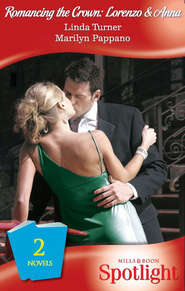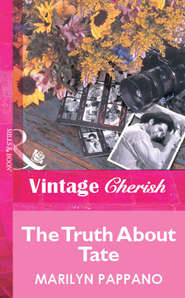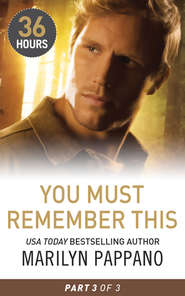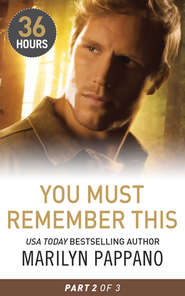По всем вопросам обращайтесь на: info@litportal.ru
(©) 2003-2025.
✖
You Must Remember This
Автор
Год написания книги
2019
Настройки чтения
Размер шрифта
Высота строк
Поля
He didn’t have the nerve yet to find out.
“Hey, I know what we can call him. Martin—”
The other female voice joined in. “Smith. Yes, of course. Perfect.”
“Who is Martin Smith?” That was the doctor, sounding disinterested as he made notes in the chart.
“He’s a character on the soap we watch. He’s tall, blond, blue-eyed—”
One of the women gave him a furtive glance that he caught from the corner of his eye, then lowered her voice. “A hunk.”
That was good, wasn’t it? It meant he didn’t look half as bad as he felt—and even without the headache, he felt pretty damn bad. He was scared.
Ever since he’d been brought back to the examination room, he’d been talked at, around and about. Finally, the doctor spoke to him. “You want to be Martin Smith?”
No. He wanted to be— He wanted to be whoever the hell he really was, not some soap opera pretty boy. He didn’t say that, though. Instead he simply nodded. He could be someone he wasn’t. He knew how to do that. Then, sooner or later, he would find out who he was.
Wouldn’t he?
“All right, Mr. Smith. You can get up now. We’re just about finished.”
He sat up on the examination table so that he was facing the mirror. Once he found the courage to look, he saw blue eyes and blond hair. The man in the mirror needed a shave. He confirmed it by rubbing his hand along his own jaw. He combed his fingers through his hair, then touched his face again. The mirror image did the same.
He was looking at himself.
He was looking at a stranger.
“If you’ll wait by the desk, Mr. Smith, I’ll have the admissions clerk call the police. Maybe they can help you find out who you really are.”
He nodded numbly, slid to the floor and followed the doctor to the desk. The chairs were still all full, so he wandered around the large room, pausing to look at bulletin boards and pictures, listening to the conversations around him to distract himself from his own problems.
“Yes, Doreen fell down the stairs when the lights went out. Doctor thinks she might have broken…”
“Melvin was in a wreck right downtown. The stoplights quit working, just like that, and some idiot who had a red light before just kept on…”
“The lights went off, and—poof—Randi just disappeared. From her own wedding! I declare…”
“Isn’t it awful about Olivia Stuart? To suffer a heart attack on the day of her son’s wedding! The poor woman.”
He stopped moving and pretended to study a poster advertising first aid classes at the local Methodist church. Olivia Stuart. Did the name mean anything to him? He couldn’t say. It felt…not familiar, but different from Doreen, Melvin and Randi.
“I heard Josie Reynolds went to her house looking for her when she didn’t show up at the wedding and found her unconscious on the kitchen floor. Bless her heart, maybe being the mayor has just been too much stress for her.”
Olivia Stuart was mayor of this town. That must be why her name stood out. That must be why he felt some vague response to her heart attack. It probably wasn’t anything—“Mr. Smith?”
If the police officer hadn’t spoken the name practically in his ear, he wouldn’t have responded. How quickly he’d forgotten the soap opera hunk. Forgetting could be a fatal error, one he rarely made.
“Will you come with us?”
As he left the waiting room with the two officers, he smiled the faintest of smiles. This time he’d forgotten the biggest, most important, most vital thing of all.
He’d forgotten himself.
Chapter One
Juliet Crandall sat at her computer, her fingers resting on the keyboard, but her attention was distant from her work—about fifty feet distant, she estimated, at a table in the library’s reference section.
The man seated there was one of Grand Springs’s intriguing mysteries. He was called Martin Smith—an unimaginative name for such an intense and handsome man—but no one knew who he really was, he least of all. He was a regular at the library, poring over newspapers, magazines, old high school yearbooks—anything that might jog his memory. It looked as if it was yearbooks today.
She wondered why he wasted his time. Grand Springs wasn’t so large that a student at one of the high schools could go totally unknown. If he had attended school here, someone would remember. A handsome face wasn’t easily forgotten. Six foot three, lean and mean weren’t very forgettable, either. No, if Martin Smith had lived here long enough to get his picture in a yearbook some twenty years ago, someone would know.
Though Juliet had been in town only a few weeks, she’d learned from library gossip that he’d been searching for ten months for some clue to his identity, and for ten months, he’d come up empty-handed. The police department—Juliet’s other new employer—had taken his fingerprints and sent them off to the state crime bureau and the FBI, but they’d gotten back a not-on-file response. So he wasn’t a cop or a criminal. He’d never been in the military, applied for a gun permit or held any sort of job that required a security clearance. Just like a few hundred million other people in the country.
Not. She’d seen her share of ordinary, everyday, average citizens, and Martin Smith, whoever he was, was definitely not like them. He was the stuff fantasies—hers, at least—were made of. Broad-shouldered, lean-hipped and long-legged. Carelessly tousled blond hair and stunning blue eyes that actors and models paid money to achieve with contacts. Skin of creamy gold as if he’d just finished up a month on a tropical beach instead of a winter of snow and ice in the Rocky Mountains. His clothes were casual—jeans, always jeans, faded ones that fit the way women wanted, and shirts, plaid flannel, chambray, plain white with the sleeves rolled up or snug-fitting T-shirts.
He was enough to distract even the most dedicated computer analyst-programmer-archivist from her work.
And she’d never even spoken to him.
He had sought help from the woman who’d held this job before her, but in her two weeks here, he’d never approached her. Maybe he’d developed a preference for working on his own. Maybe he’d simply run out of things to check. Maybe he just didn’t think she had anything to offer him.
That wouldn’t be a first.
With a sigh, Juliet forced her gaze from the window that was her small office’s only interesting feature and tried to focus on the computer screen. Grand Springs was finally bringing its library into the age of technology, reorganizing and computerizing. It was her job—every Tuesday and Thursday, at least—to do just that. The rest of her work week was spent at the police department, upgrading their computer system to allow them to take full advantage of the FBI’s new computer systems. When both jobs were completed, she’d be taking a full-time position in the police department as head of their records division. It wouldn’t be exciting, but at least it was different from what she’d done previously.
She’d lived all her life in the same Dallas neighborhood—heavens, in the very same house. It had been cheaper to live at home while attending college, cheaper than getting a place of her own when she’d gone to work. After her father’s death, she’d stayed to help her mother, and after her mother’s death, she’d stayed because it was comfortably familiar. Just as she’d stayed at the same job all those years, sitting in the same cubicle at the same keyboard, seeing the same people. She had shopped at the same stores, followed the same routines and faced the same depressing future.
At least here things were different. Not perfect. No, she was still the same shy, quiet woman she’d always been. She still didn’t have many friends. She still got all hot and tongue-tied at the idea of dealing with members of the opposite sex unless they were old enough to be her father or young enough to be her son. She still spent all her free time alone, and she still conducted her social life—what there was of it—in cyberspace.
She’d had hopes for more—that she would fit in here in a way she never had in Dallas. That she would make friends. That she might even meet the mysterious man she’d dreamed of since childhood who would sweep her off her feet with offers of marriage, babies and happily-ever-afters. After all, her last birthday had put her squarely in her mid-thirties. Time was slipping away fast. Just yesterday she’d been a dreamy teenager, lost in the books that were her refuge, convinced that someday her life would change. Tomorrow she would be a sad old maid, lamenting life’s unfairness, regretting the emptiness and loneliness. Today was all she had.
“Excuse me.”
For a moment, lost in the future she dreaded, Juliet didn’t respond to the quiet interruption. When she finally looked up, she wished she hadn’t. Her face grew warm, her mouth went dry, and her fingers went limp on the keyboard.
“You’re the new computer whiz.”
All she could do was stare and nod dumbly.
“I’m Martin Smith.” His mouth twisted in what might have been meant as a smile but was actually a grimace. “At least, that’s who I’ve been since last June.” He came farther into the room and extended his hand.
Her palm was probably sweaty, but it would be too noticeable if she took time to wipe it on her dress. She shook his hand, then quickly drew back.
“You’re…?”
The heat in her cheeks increased a few degrees. It was a simple process. He gave his name, and she offered hers. How could she forget? “Juliet. Crandall. I’m new. I replaced—” The other archivist’s name flew right out of her memory. “Whoever used to do this. The computers and…” Sure that she had sufficiently embarrassed herself, she lapsed into silence with her hands tightly clasped in her lap. Too bad Martin Smith hadn’t approached her via computer. E-mail and real-time chats were so easy. Jcrandall@gsc.edu could easily converse with anyone in the world. Juliet Crandall, face-to-face, couldn’t talk to anyone.
Without waiting for an invitation—one she never would have thought of offering—he sat in the only other chair in the room. “I don’t know if you’ve heard about me—”











